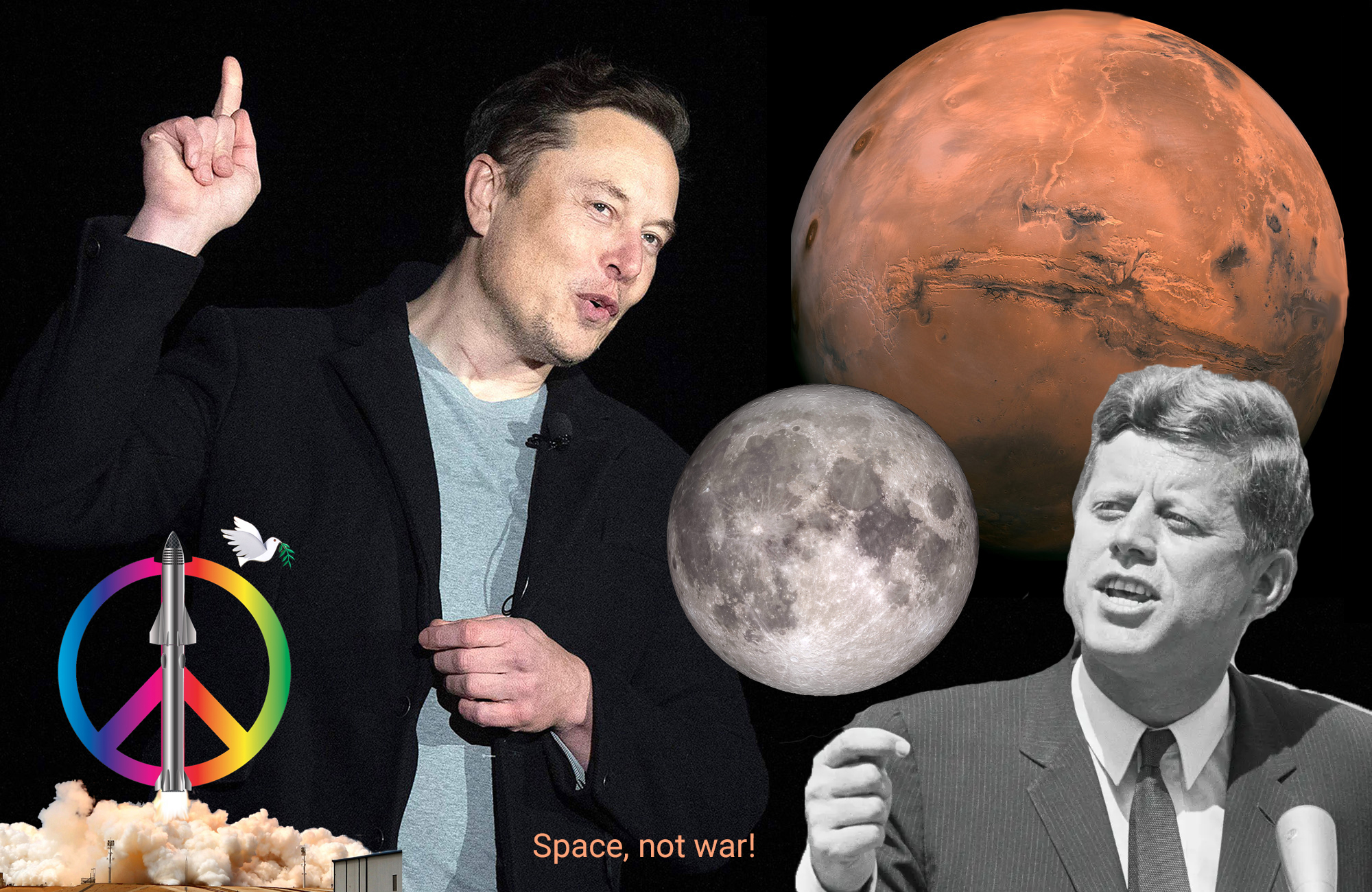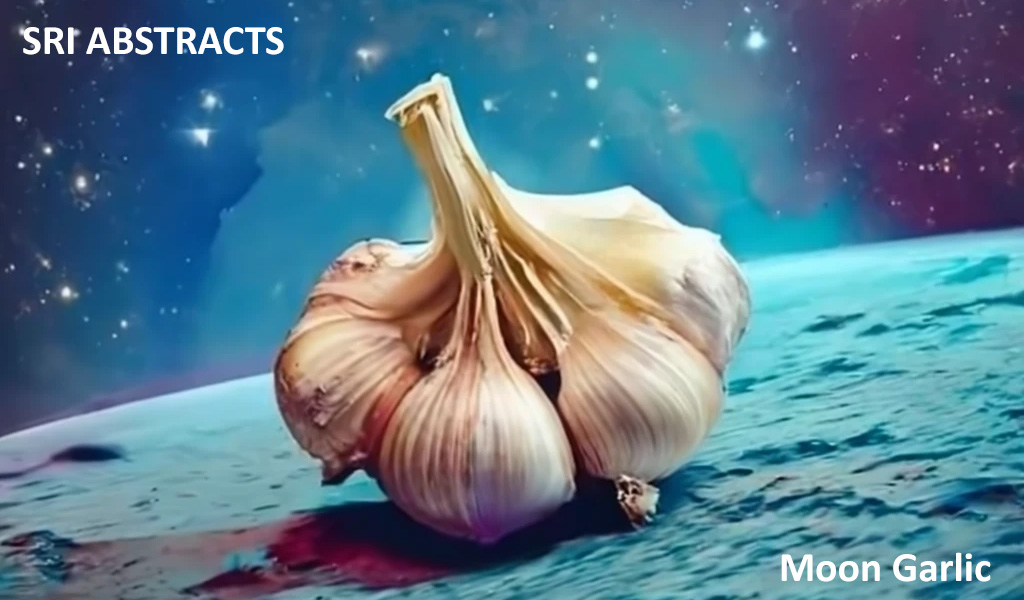
A newsletter with 2 titles!
The SRI President Bernard Foing and the SRI CEO and Founder A. V. Autino are in agreement on the text of this newsletter, but not on the title(!). We decided therefore to issue it with two titles. The first one, by A.V. Autino, establishes an ideological distance from the governance model that brought the civilization to the current situation, refusing any direct co-responsibility. The title proposed by B. Foing implies that “we” (the global society) are responsible for the general failure since we voted for the current leaders. He also suggested that should “we” (space humanists) be governing, he’s not sure that we would be able to do better than current leaders, for peace and development. Better than warmongers for sure! Replied Autino. However, both titles are true and have their reasons. That’s why we don’t want to choose one…
Both “reasonable” and crazy governance models have failed: now is the time for visionaries – A. V. Autino
We have failed so far: now is time for Space4all and peace, uniting citizens, leaders, and explorers – B. Foing
During the first decade of the new millennium, the general psychological attitude was characterized by a sense of expectation: well, the 2000s are here, what will happen now? Yet the political leaders kept going ahead as if nothing had happened. While the world’s main issues were incubating and worsening, and peoples of Earth were waiting for urgent actions, very reasonable leaders did their best to keep people calm, “educating” people to patiently wait for better times to come, having faith in the programs of the big institutions, and the very responsible guide of EU, US, and the other big powers. The globalized information made more and more people aware of the big social differences between industrialized and non-industrialized regions, and the big migration processes were increasing in intensity. The dramatic lack of new jobs, both in advanced and developing countries was biting the societies. Pollution and climate changes were worsening as well. On the good side of the scene, the new space economy was moving first steps, with the victory of the X-Prize by ScaledComposites, and the demonstration that low-cost access to space was possible. A number of space startups were born, including Space X, founded by Elon Musk, Blue Origin, by Jeff Bezos, and Virgin Galactic, by Richard Branson. Space Tourism has been cleared through customs, from science fiction to real life.
The second decade of the 21st Century brought more awareness about the total incapacity of the world’s political leaders to overcome multiple crises. Instead of collaborating to solve the major issues, geopolitics manifested a worrying tendency to become more litigious, exacerbating the many latent conflicts, and controversial situations, such as the boundaries between Europe and Russia, China and some contended states, the Middle East, and the two Koreas, to make few examples. About 70 conflicts on planet Earth made Pope Francis talk about a “world war in pieces”. Yet, good willing people didn’t stop to restlessly work: in 2015 Space X successfully experimented with the first reusable rocket’s first stage and bootstrapped an age of downsizing of the launch costs. In 2015, fully unaware of the rising new space economy, the United Nations delivered to history their 2030 Agenda for Sustainable Development: the 17 Sustainable Development Goals. In such an agenda, no mention of space was made. Yet, the new space economy was growing impetuously.
The third decade of the 21st Century was initiated under a weird star. People seem to be now aware that reasonable leaders will not solve the problems. We can say that reasonable leaders, still moving on the basis of XX Century’s agendas, have failed, worldwide. Therefore, people have begun voting for irrational leaders. Unfortunately, no irrational visionary leader was available, worldwide. Let’s say that the few visionaries are too busy working to develop technological solutions, aiming at the space frontier. So, people directed their choice toward the only available crazy leaders: populist, nationalist, far-right, and religious extremist ones. While we are writing, two conflicts, both on European boundaries, are at risk of precipitating the world into World War III: the war between Russia and Ukraine, for the control of the Donbas region, and the war between Hamas and Israel, for the control of the Gaza Strip. The peoples of Planet Earth seem to be resigned to this status of new and old conflicts flaming everywhere. The choice of irrational leaders couldn’t bring “solutions” other than these ones. So, pandemics and wars are now distracting the people’s attention from the previous concerns, such as climate change, pollution, unemployment, economic crisis, etc… Yet, these crises are going ahead, and worsening, however. New emergencies are added to old ones that have not yet been overcome. Btw, while wars of the past have often pushed ahead industrial development, many commenters, analyzing the current situation, are saying that these conflicts are depressing the global economy. Several factors are bringing the global economy to limp along, not sprinting[1]. Growth will slow from 3.5% (2022) to 3% in 2023 and 2.9% in 2024. This remains well below historical averages. Worth recalling that we humans are spending 2 trillion each year on weapons and military expenditures. What could be done, on Earth and in space, with even a fraction of such crazy waste??
A general sense of impotence is pervading the society. Impotence generates availability to violence, which is growing everywhere. During the most acute phases of the COVID-19 pandemic, we have seen how devastating social confinement can be for civilization: all of our social relationships have rapidly decayed, young people have been demotivated and left schools, people haven’t met or fallen in love, and many have lost enthusiasm for working together. Human society seemed to be condemned. True social sustainability must at minimum encompass several dimensions: environmental, social, economic, and cultural. The common factor in all of these dimensions is development. The U.N. 2030 Agenda recognized this (in theory), but unfortunately failed to provide an efficient strategy (in practice) for development. All of the key indicators clearly demonstrate that no sustainable development is possible if confined to the limits of our home planet.
Is such a situation far from a status of civilization implosion? We believe we are in the first stages of such an age. And the only thing that can reverse it, is the announcement of great enhancements and projects, on the path of Civilian Space Development. That may reverse the general sense of impotence, and give to peoples of Earth the needed psychological fortitude to face the challenges of this time. With this aim, responding to the call issued by Space Renaissance International and the National Space Society, almost 70 organizations joined together to propose an 18th SDG, focused on civilian-led space development, to be added to the 2030 United Nations Agenda for Sustainable Development: “Space for All, on Earth and Beyond”.
Want to discuss this? You can do it on the SRI Open Forum: https://groups.google.com/g/sri-open-forum/c/A8dnyVT3PG0
Sign the Space 18th SDG Petition online https://www.change.org/space18sdg
Join the Space 18th SDG Coalition https://spacerenaissance.space/sign-the-18th-sdg/
Stay tuned with the campaign for Space 18th SDG: https://space18thsdg.space/
[1] “Transcript of October 2023 World Economic Outlook Press Briefing” https://www.imf.org/en/News/Articles/2023/10/10/tr101023-transcript-of-october-2023-world-economic-outlook-press-briefing
Join the SRI Crew: https://spacerenaissance.space/membership/international-membership-registration/
Donate some money: https://spacerenaissance.space/donate-to-space-renaissance/
Watch and subscribe to the Space Renaissance YouTube channel: https://www.youtube.com/@spacerenaissance









 Space Renaissance France (French Chapter of SRI)
Space Renaissance France (French Chapter of SRI)  Space Renaissance USA, Inc. (USA Chapter of SRI)
Space Renaissance USA, Inc. (USA Chapter of SRI) Space Renaissance (Italian Chapter of SRI)
Space Renaissance (Italian Chapter of SRI) Space Renaissance Academy
Space Renaissance Academy Space Renaissance Initiative Group
Space Renaissance Initiative Group